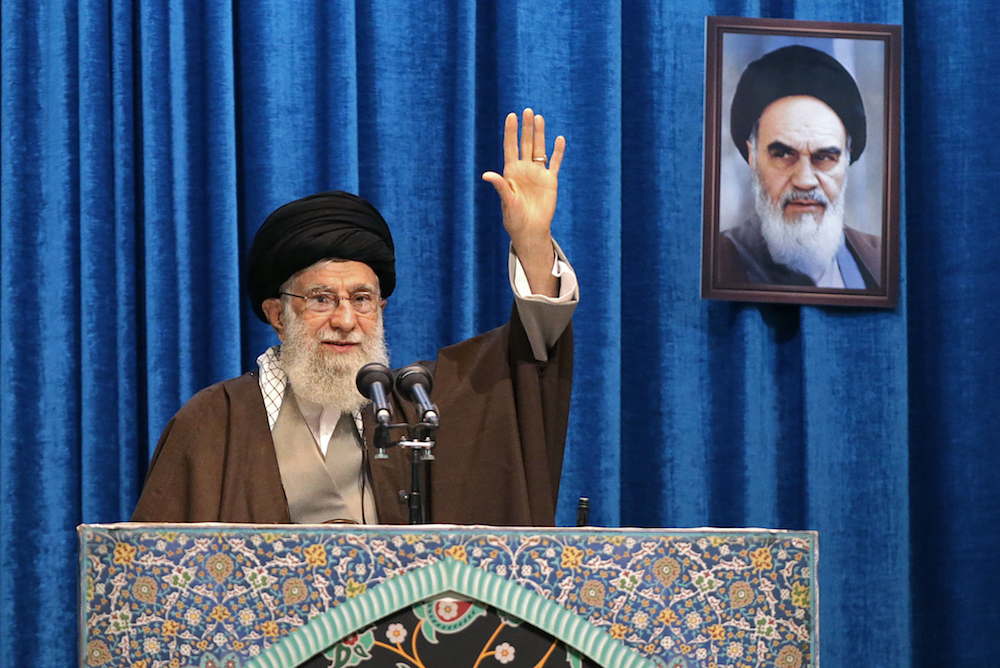
- ARAB NEWS
- 01 Jul 2025

Amid the coronavirus crisis, the Islamic republic is advancing its nuclear program and violating the Joint Comprehensive Plan of Action (JCPOA), commonly known as the Iran nuclear deal. The UN’s atomic watchdog, the International Atomic Energy Agency (IAEA), reported that Tehran has increased its uranium stockpile, which now stands at the equivalent of 1,510 kg. Under the nuclear deal, Iran was limited to 300 kg of weaker enriched uranium.
This reveals a substantial increase in Iran’s enriched uranium stockpile in a short period of time. Tehran currently possesses five times more enriched uranium as it is supposed to have under the agreement. More importantly, the theocratic establishment now has enough enriched uranium to refine and build a nuclear bomb. Approximately 1000 kg of uranium enriched at just 5 percent can be refined to create one nuclear bomb.
For the Iranian regime, one of the most effective times to expand its nuclear activities comes when media outlets and the international community are focusing on other urgent issues. The coronavirus has taken the global spotlight and governments around the world are attempting to halt its spread. This seems to have given the Iranian regime a perfect opportunity to work on its nuclear program at a faster pace.
This is probably why the international community remains silent in the face of the IAEA’s alarming report. Iranian leaders claim that the Supreme Leader Ayatollah Ali Khamenei is against obtaining nuclear weapons. The foreign minister, Mohammad Javad Zarif, said at the Munich Security Conference last month that “We have always said we are not interested in building nuclear weapons.”
But if Iran is truly not seeking nuclear weapons, why is it still banning the IAEA’s inspectors from visiting its nuclear sites and why is declining to cooperate with the watchdog? According to a recently published second report by the IAEA: “the agency identified a number of questions related to possible undeclared nuclear material and nuclear-related activities at three locations in Iran.”
With or without the deal, the Islamic Republic is required to disclose its nuclear activities and sites to the IAEA as part of the treaty on the non proliferation of nuclear weapons (NPT).
Dr. Majid Rafizadeh
Rafael Grossi, the new head of the group, told journalists when he was meeting French President Emmanuel Macron: “Iran must decide to cooperate in a clearer manner with the agency to give the necessary clarifications.”
This issue has nothing to do with the nuclear deal. With or without the deal, the Islamic Republic is required to disclose its nuclear activities and sites to the IAEA as part of the treaty on the non proliferation of nuclear weapons (NPT). Iran is a member to the NPT. Therefore, Iranian leaders cannot place the blame on the US for withdrawing from the nuclear deal.
It should also be noted that the three undeclared locations in Iran which the IAEA is investigating are different from the clandestine nuclear site that Israel and two non-partisan organizations based in Washington — the Institute for Science and International Security and the Foundation for the Defense of Democracies — revealed last year. Prime Minister Netanyahu stated in his speech to the UN General Assembly that Iran had a “secret atomic warehouse for storing massive amounts of equipment and material from Iran’s secret nuclear weapons program.” Tehran claimed that the warehouse, which is located in a village in the suburbs of Tehran, was a place where carpets were cleaned.
The IAEA’s inspectors were able to detect traces of radioactive uranium at the site. Israel’s warning and other reports had proved accurate. The head of the IAEA stressed recently this issue again: “The fact that we found traces (of uranium) is very important. That means there is the possibility of nuclear activities and material that are not under international supervision and about which we know not the origin or the intent. That worries me.”
The international community must take immediate steps to halt Iran’s march toward nuclear weapons. Unfortunately, its leaders continue to benefit from the disunity between European and American policy. If this gap is not bridged and if the EU does not change its position toward Tehran, we may soon see an Iranian regime with nuclear weapons, amplifying its destructive behavior and military adventurism in the region. A united front, comprising joint sanctions, would send a clear message and engender an economic stranglehold which would force the Iranian government to concentrate on its domestic agenda. If the international community remains silent, the Iranian regime’s violations will escalate, and the stability of the Middle East will continue to suffer as Tehran pursues its subversive agenda.
The regime has crossed a major threshold concerning its nuclear program. The international community must act immediately and maintain its focus on preventing Tehran from acquiring nuclear weapons.
Dr. Majid Rafizadeh is an Iranian-American political scientist. He is a leading expert on Iran and US foreign policy, a businessman and president of the International American Council. Twitter: @Dr_Rafizadeh